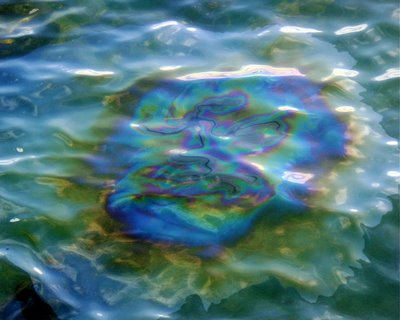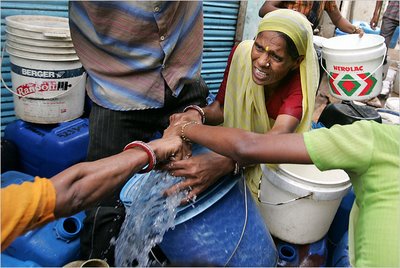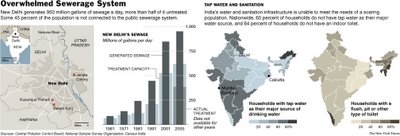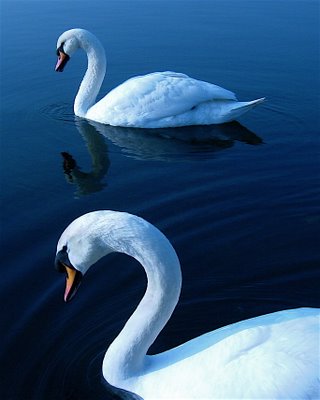 You may have seen this photo on another of my blogs recently, but it just fit too well with this post not to use it again. Sorry for the duplication.
You may have seen this photo on another of my blogs recently, but it just fit too well with this post not to use it again. Sorry for the duplication.We hear a lot of talk about oil these days. Soaring prices (though we feel a temporary respite at the moment). The source of middle east strife, propped-up monarchies, reasons for war, etc. Increasing world energy demands, decreasing supplies, etc. Global warming, pollution, etc.
But let's talk about something that is only simmering on the back burner right now -- don't worry, it will come to a boil soon enough: water.
I recently visited India, in particular the city of New Delhi with a visit to Agra. This was a business trip, and as such, I was put up in the highest of the high rent districts, in amongst the diplomatic housing. For any that have traveled, even in this country, that is surely the nicest of the nice areas. And it was.
Sure, you could drive a short distance and still find slums and shacks, but this city looked like it had some modern potential. It looked like there was a plan. It seemed from this very limited perspective as if the tide was coming in, and perhaps it would lift all boats.
Then just today, I read this article in the New York Times. If you have a minute, I commend it to you.
Here is a brief abstract to make my point, and the rest of the article paints conditions significantly more dire. But this is how it appears to some in the middle class:
The quest for water can drive a woman mad.
Ask Ritu Prasher. Every day, Mrs. Prasher, a homemaker in a middle-class neighborhood of this capital, rises at 6:30 a.m. and begins fretting about water.
It is a rare morning when water trickles through the pipes. More often, not a drop will come. So Mrs. Prasher will have to call a private water tanker, wait for it to show up, call again, wait some more and worry about whether enough buckets are filled in the bathroom in case no water arrives.
“Your whole day goes just planning how you’ll get water,” a weary Mrs. Prasher, 45, recounted one morning this summer, cellphone in hand and ready to press redial for the water tanker. “You become so edgy all the time.”
In the richest city in India, with the nation’s economy marching ahead at an enviable clip, middle-class people like Mrs. Prasher are reduced to foraging for water.
Take a moment and close your eyes. Now just imagine that the basic infrastructure of clean, abundant water and functioning(out-of-sight) sanitation is gone or severely disrupted. Try to imagine how your life would be different. Lacking clean drinking water. Uncertain if you will turn on your faucet and get potable water, or frankly any water at all. And the situation gets worse over time, as the population around you swells, ground water supplies continue to shrink, and competition for this most basic of life's necessities increases. The stress would be unimaginable. You would start fighting for water (not oil) -- the lifeblood of mankind.
 Source: NYTimes article cited above.
Source: NYTimes article cited above.Of course it is so very hard to get into this mindset. We would just move if conditions around us got that bad. But you have to take a broader view. New Delhi is the most modern of India's cities. Elsewhere, things are worse.
 Source: NYTimes article cited above. Click on the graphic to enlarge it.
Source: NYTimes article cited above. Click on the graphic to enlarge it.So what is my point? First, as India promotes itself as the largest emerging democracy, it is sobering that so many basic necessities are still lacking. India has placed a premium on education as the means to bring itself out of colonial times and onto the world stage. It is, after all, now a nuclear power. And yet that technical prowess has yet to manifest into satisfying basic necessities. To me that seems to be the most basic role of Government and its leaders.
And second, now please consider your own situation. Perhaps worrying about whether to get the 42" plasma TV or the 44" LCD HDTV is really not worth fretting about.
I'm sorry. I don't mean to be snide. I just mean that when you think life isn't giving you everything you want, maybe that's because it has given you everything you need. So maybe boundless gratitude should replace any anxiety. And after reveling in that gratitude, think about what you can do to ensure that our sons and daughters will have at least as much of life's needs provided for them as well.
Now I think I'm going to have a nice cup of tea, from my magic faucet that just keeps providing and providing glorious, clean, refreshing, water. The true elixir of life.


